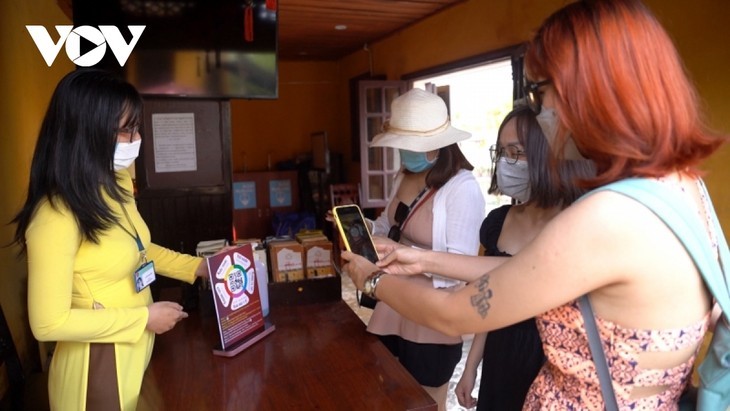(VOVWORLD) - Due to strong impacts from the COVID-19 pandemic, digital transformation has proved to be one of the most effective solutions to recover and develop sustainably for the future. Quang Nam province, which is hosting National Tourism Year 2022, is accelerating digital transformation and IT application to develop a green tourism ecosystem, considering it a key to tourism recovery and development.
 Since April 1, tourists can purchase electronic entrance tickets to tourist sites in advance. Photo: VOV Since April 1, tourists can purchase electronic entrance tickets to tourist sites in advance. Photo: VOV |
Due to the COVID-19 pandemic, tourism activities were suspended causing great losses for the tourism sector. In order to recover the tourism post-pandemic, the only solution is to digitize or promote digital tourism. In fact, digital tourism or digital transformation means developing the tourism in a smart way using digital technology to create the most convenient products and services for tourists.
To improve the competitive edge of Vietnam’s tourism sector, one of the four major strategies is to accelerate digital transformation through developing smart tourism and applying information technology.
Le Hung Anh, founder of Traveler, a business that develops smart tourism, says tourists’ habits have changed and so has the way they search for tourism information. With the emergence of digital transformation, tourism activities have also changed. Digital transformation is an inevitable trend for travel companies to expand their market amid the current fierce competition.
For businesses, digital transformation in the tourism sector is not just an alternative strategy but has become normal practice to improve their competitiveness and to meet the growing demand of customers. This is a challenge but also an opportunity for businesses to renovate themselves and to safely adapt to the new normal.
Le Hung Anh said: "Applying information technology at this time is very important. Currently, most customers have used applications to book hotel rooms, or buy air tickets."
Being one of 5 provinces to pilot the incoming of foreign tourists following the height of the pandemic, Quang Nam province considers the application of information technology as one of the top priorities.
 Currently, almost all customers book hotel rooms and air tickets through mobile apps. Photo: VOV Currently, almost all customers book hotel rooms and air tickets through mobile apps. Photo: VOV |
The local administration of Hoi An city, Quang Nam province has strengthened its IT, prepared technology infrastructure at destinations, provided free wifi, and promoted tourist products on digital platforms and social networks.
Since April 1, 2022 Hoi An has sold e-entrance tickets to gradually replace paper tickets. Truong Thi Cam Nhung and other tourists from HCM City say they are satisfied with the updates. By maximizing applications on smart devices, tourists can easily find the products they want.
Ms Nhung said: "Tourists to Hoi An can access services by using applications which" are very convenient and quick. Young tourists can access information easily and can introduce the services to their friends with accurate information."
Since Hoi An ancient town and the My Son towers were recognized by UNESCO as World Cultural Heritages, Quang Nam provincial authorities have made a great effort to make the province an attractive destination for domestic and foreign visitors.
In post-pandemic recovery, local authorities and businesses are accelerating the use of information technology to meet the needs of visitors.
Quang Nam province has worked out a Plan on Digital Transformation in Tourism until 2025. Under the plan, in the 2021-2023 period, the province will complete the digitization of all data on tour guides, travel agencies, tourism businesses, hotels, tourism destinations, and scenic spots in the province. In the 2023-2025 period, the province will continue to upgrade their smart tourism system using new technologies, update new tourism data, and develop VR tourism using data maps and VR360 technology at destinations and scenic spots.
After two years of almost no tourism due to the pandemic, Vietnam’s tourism is recovering and gaining its momentum, drawing both domestic and foreign visitors. With its dynamism and creativity, the tourism sector is making an effort to welcome back tourists this year and in the following years. Digital transformation is considered the key for the sector to make a breakthrough.
Addressing the launch of the National Tourism Year 2022, Prime Minister Pham Minh Chinh asked that the tourism sector be consistent with values that uphold an image Vietnam as a safe, friendly, and attractive destination.
Mr. Chinh said: "We need to have new thinking and solutions to turn threats into opportunities. As the pandemic is not over, tourism activities need to be held in a safe, scientific manner. Technology innovation is now the inevitable trend worldwide.
Key words for Vietnam’s tourism in the coming time will include cooperation, development, greening, digitization, and friendly connection."
The Vietnam Tourism Administration is currently implementing a Master Project on Digital Transformation with the aim of establishing an information axis connecting services. The Administration also intends to create an e-transaction floor to connect tourism service providers and tourists. These platforms are expected to provide a digital environment for tourism stakeholders. Tourism and technology businesses are urged to catch up with tourism trends to work out prompt solutions and bring ideas to create effective, unique digital tourism products.
90% of tourism businesses in Quang Nam province have resumed operation. By launching various stimulus packages and promotion activities, the province’s tourism sector has witnessed positive signs for recovery and development.
In the first half of this year, the province welcomed more than 1.5 million visitors, 4.8 times higher from last year. Quang Nam province is strengthening digital transformation considering it a key to socio-economic development.